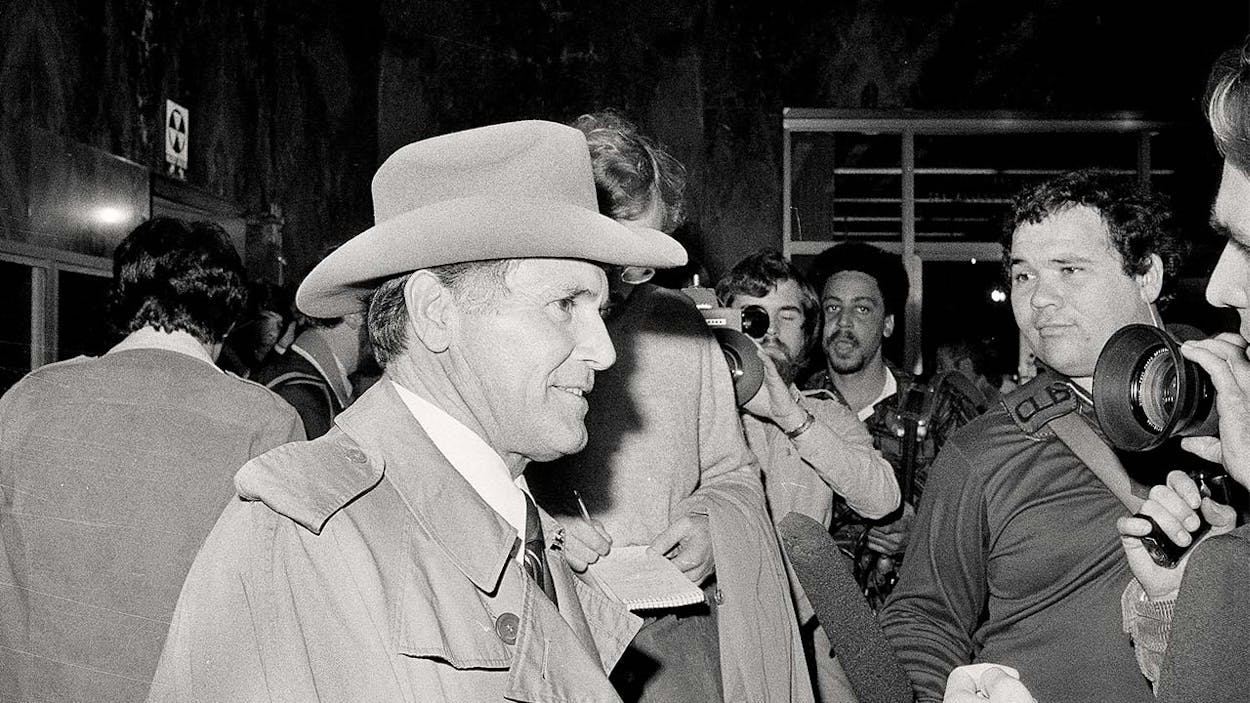Richard “Racehorse” Haynes, who died on April 28 at the age of ninety, wasn’t central casting’s idea of a great criminal defense attorney. Born in Houston to a plasterer and a laundress, he was shipped off to San Antonio at a young age to stay with his grandmother for six years, before returning to Houston. In school, he excelled at boxing (he was a welterweight) and football, from which his nickname derived: a coach hung it on him in honor of his knack for zigzagging around the field like Gale Sayers instead of bulldozing an Earl Campbell–esque straight line. It was a necessity, given his diminutive stature, but the helter-skelter approach would later inform his courtroom strategies.
When Haynes was all of seventeen years old, he found himself far from the Texas gridiron: storming the beach at Iwo Jima, where his heroic actions earned him the Navy and Marine Corps Medal. Six years later he returned to service, this time as an Army paratrooper in Korea.
After his military stints, Haynes served as president of the University of Houston student body. During those Red Scare years, he was asked to sign a “loyalty oath.” “I wouldn’t sign it,” Haynes said, years later. “I said, ‘I’m not a damn communist, and I don’t need to sign an affidavit to anybody to say I’m not. Just check my war record.’ ”
That wouldn’t be the last time Haynes bucked the system. After he received his bar card, in 1956, Haynes became a protégé of the legendary Houston defense attorney Percy Foreman, who taught him a lesson about representing accused murderers he would never forget. “If you can prove that the guy your client murdered was guilty of abusing a horse or a dog and you can prove that to the jury, the jury will acquit your client,” Foreman told his young apprentice.
Haynes became a master of the misdemeanor grind—during one stretch, he reportedly won 163 drunk-driving cases in a row—while paying his clerks a “pittance,” according to the son of one clerk who wished to remain anonymous. Not only did he underpay them, but he would also win back their meager salaries over the card table every Friday night, the source recalls.
Haynes is not, of course, remembered today for being a skinflint or for his vigorous defense of DUIs. We remember him because, in 1971, he created a daring role for himself: the flamboyant “Big Rich” Texas defense attorney who treats the courtroom like a theater and, seemingly against all odds, gets his client acquitted. Though other lawyers gained fame with similar schticks—Dick DeGuerin, Mike Ramsey, and even career prosecutor Kelly Siegler come to mind—it was Haynes who debuted that persona, during the trial of River Oaks plastic surgeon John Hill. Hill, who was accused of murdering his wife with a poison-laced éclair, won a mistrial but wouldn’t live to see a second trial—he was killed by a hit man in 1972. That trial and its aftermath would spawn the best-selling book Blood and Money and the TV movie Murder in Texas, in which Haynes was portrayed ably by Port Arthur–bred character actor G. W. Bailey.
After that, Haynes was on speed-dial for powerful people who found themselves in tight spots. One such person was T. Cullen Davis, a Fort Worth oilman who became, in 1977, the richest man in the country to ever stand trial for murder. The victim was his twelve-year-old stepdaughter. Though the evidence against Davis was strong—two people placed him at the scene with a gun—Haynes got an acquittal. His strategy was one Percy Foreman would have approved of: hammering relentlessly on Davis’s wife Priscilla’s sex life. “By the second week of the thirteen-week trial, the jury was ready to stone her,” Gary Cartwright wrote in these pages two years later. (Davis was tried a second time, for the attempted murder of Priscilla, and acquitted once again. Cartwright chronicled those trials in his book Blood Will Tell: The Murder Trials of T. Cullen Davis, the inspiration for the TV movie Texas Justice, in which Haynes was portrayed less ably by the Chicago-bred Dennis Franz, gamely but vainly attempting a Texas drawl.)
While the Davis and Hill cases brought Haynes about as much renown as a criminal defense attorney can hope to attain—and fierce criticism for his trashing of Priscilla Davis, which some regarded as beyond the pale—he claimed that it was a much lower-profile case that brought him the most satisfaction. Years ago, he’d defended a black man who was charged with stealing tools from a work site. In fact, as Haynes all but proved in court, one of the man’s white colleagues had been the actual culprit.
“The jury found him not guilty, and after that, [the defendant’s family] had a little party for me in their house out in the Third Ward,” Haynes recalled. “The kids were there, and they put signs on the wall, ‘God bless lawyer Haynes.’ I felt that was the biggest case I ever won; I contributed to the well-being of that family and made them happy.”
Spoken like a man who advised young lawyers to read To Kill a Mockingbird once a year. “Get your mind set that there is a way to get justice, but you’re going to have to fight for it in this country,” he said once. “Even in this great country, where we have the rules that are set up to give you a fair trial and make it a level playing field, you still have to fight for it. Ain’t nothing free.”
Reached for comment, Houston defense attorney Dan Cogdell, a Haynes protégé, summed up this towering Texan’s life—and afterlife—with a prediction: “Jesus Christ best expect a long and tedious cross-examination.”
- More About:
- Obituaries








